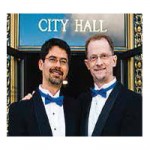 By Stuart Gaffney and John Lewis
By Stuart Gaffney and John Lewis
Three months ago, a young gay couple in their 20s in Aceh, Indonesia, was caned 83 times before a jeering crowd outside of a mosque after a Sharia court convicted them of the “crime” of the physical expression of their love for each other. According to news reports, vigilantes stormed the couple’s home and found them in bed together. BBC News described the scene of their torture: “The (gay) men stood on stage in white gowns praying while a team of hooded men lashed their backs with a cane … . A large crowd of observers cheered as the caning took place. ‘Let this be a lesson to you,’ one of the men watching cried out. ‘Do it harder,’ another man yelled.”
A BBC reporter who witnessed the flogging described how “you could definitely see … [the victims’] emotion[s]” on their faces, how “they were gripping their hands tightly” and how “extremely frightened and shaken” one of them was. The caning took place after the men survived two months in a prison with many homophobic inmates. The BBC reported that one of the men was in the final years of medical training to become a doctor, but that his university has now expelled him.
In addition to the obvious trauma these actions inflicted on the couple, the flogging spread fear across the LGBT community in Indonesia—as have anti-LGBT atrocities spread great fear in Chechnya. Recently, 141 people were arrested at what Indonesian police called a “gay sex party” in the nation’s capital Jakarta.
The arrest and flogging horrified us as it did millions of other people around the world, as has the shocking oppression taking place in Chechnya. We felt a visceral connection to the couple, and imagined how terrified we would be if vigilantes broke into our bedroom in the middle of night as we rested in bed together. We reflected on the threat to the men’s lives in prison and the physical pain and indignity they suffered at the flogging. We wondered if we would have the fortitude to survive such an imprisonment and flogging as they did.
Although we have never endured anything remotely comparable to what this young couple did, we identified personally with their experience because we, like many other LGBT people, have feared for our physical safety and faced public shaming because of who we are and whom we love. Indeed, no other aspect of our being able to marry legally was more powerful than the sense of dignity it gave us as citizens. As the final words of the U.S. Supreme Court’s landmark nationwide marriage equality decision reads, LGBTQ people “ask for equal dignity in the eyes of the law” and “the Constitution grants them that right.”
But perhaps the most important connection we experienced to the couple was that of love. Amidst all that happened to them, we thought about how much these two gay men loved each other. They risked everything for their love, and the physical and emotional tenderness of their care for each other was more than the vigilantes, the torturers and the taunting crowds could bear. For years, we marched down Market Street as part of marriage equality contingents in the annual Pride Parade, shouting to the crowds, “It’s all about love! It’s all about pride!”
This young gay couple in Aceh inspires us. Our hearts go out to them and are with them. We dare to hope that their love survives. We dare to dream that someday “love wins” in Aceh and in the rest of Indonesia and the world.
John Lewis and Stuart Gaffney, together for over three decades, were plaintiffs in the California case for equal marriage rights decided by the California Supreme Court in 2008. Their leadership in the nationwide grassroots organization Marriage Equality USA contributed in 2015 to making same-sex marriage legal nationwide.
Recent Comments